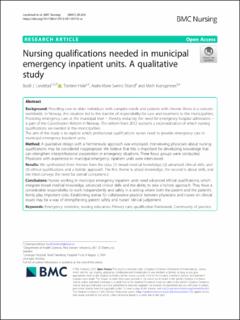| dc.contributor.author | Landstad, Bodil | |
| dc.contributor.author | Hole, Torstein | |
| dc.contributor.author | Strand, Aasta Marie Sveino | |
| dc.contributor.author | Kvangarsnes, Marit | |
| dc.date.accessioned | 2023-02-24T07:37:37Z | |
| dc.date.available | 2023-02-24T07:37:37Z | |
| dc.date.created | 2021-11-16T22:03:09Z | |
| dc.date.issued | 2021 | |
| dc.identifier.citation | BMC Nursing. 2021, 20 1-8. | en_US |
| dc.identifier.issn | 1472-6955 | |
| dc.identifier.uri | https://hdl.handle.net/11250/3053721 | |
| dc.description.abstract | Background: Providing care to older individuals with complex needs and patients with chronic illness is a concern worldwide. In Norway, this situation led to the transfer of responsibility for care and treatment to the municipalities. Providing emergency care at the municipal level – thereby reducing the need for emergency hospital admissions – is part of the Coordination Reform in Norway. This reform from 2012 warrants a reconsideration of which nursing qualifications are needed in the municipalities. The aim of the study is to explore which professional qualifications nurses need to provide emergency care in municipal emergency inpatient units. Method: A qualitative design with a hermeneutic approach was employed. Interviewing physicians about nursing qualifications may be considered inappropriate. We believe that this is important for developing knowledge that can strengthen interprofessional cooperation in emergency situations. Three focus groups were conducted. Physicians with experience in municipal emergency inpatient units were interviewed. Results: We synthesised three themes from the data: (1) broad medical knowledge; (2) advanced clinical skills; and (3) ethical qualifications and a holistic approach. The first theme is about knowledge, the second is about skills, and the third conveys the need for overall competence. Conclusions: Nurses working in municipal emergency inpatient units need advanced ethical qualifications, which integrate broad medical knowledge, advanced clinical skills and the ability to take a holistic approach. They have a considerable responsibility to work independently and safely in a setting where both the patient and the patient’s family play important roles. Establishing arenas for collaborative practice between physicians and nurses on clinical issues may be a way of strengthening patient safety and nurses’ clinical judgement. Keywords: Emergency medicine, nursing education, Primary care, qualification framework, Community of practice | en_US |
| dc.description.abstract | Nursing qualifications needed in municipal emergency inpatient units. A qualitative study | en_US |
| dc.language.iso | eng | en_US |
| dc.publisher | BMC | en_US |
| dc.relation.uri | https://bmcnurs.biomedcentral.com/articles/10.1186/s12912-021-00733-w#citeas | |
| dc.rights | Navngivelse 4.0 Internasjonal | * |
| dc.rights.uri | http://creativecommons.org/licenses/by/4.0/deed.no | * |
| dc.title | Nursing qualifications needed in municipal emergency inpatient units. A qualitative study | en_US |
| dc.title.alternative | Nursing qualifications needed in municipal emergency inpatient units. A qualitative study | en_US |
| dc.type | Peer reviewed | en_US |
| dc.type | Journal article | en_US |
| dc.description.version | publishedVersion | en_US |
| dc.source.pagenumber | 1-8 | en_US |
| dc.source.volume | 20 | en_US |
| dc.source.journal | BMC Nursing | en_US |
| dc.identifier.doi | 10.1186/s12912-021-00733-w | |
| dc.identifier.cristin | 1955333 | |
| cristin.ispublished | true | |
| cristin.fulltext | original | |
| cristin.qualitycode | 1 | |

